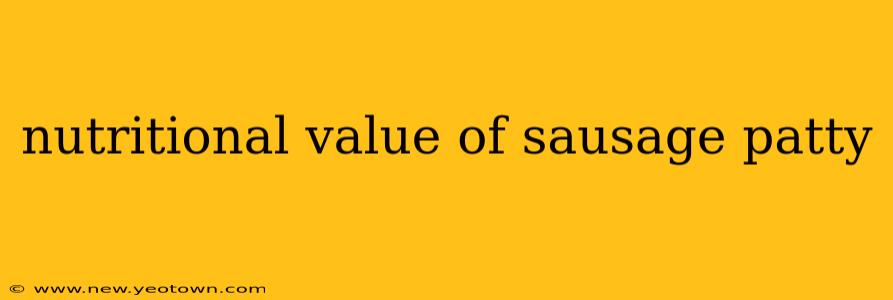The aroma of sizzling sausage patties, a breakfast staple for many, often overshadows a deeper consideration: what exactly are we consuming? While the juicy, savory taste is undeniably tempting, understanding the nutritional value of a sausage patty is crucial for making informed dietary choices. This isn't just about calories; it's about the balance of protein, fats, and other nutrients that contribute to our overall health. Let's delve into the details, exploring the variations and what makes a sausage patty a complex culinary item.
What is the Nutritional Content of a Typical Sausage Patty?
A typical pork sausage patty (around 4 ounces) can boast a surprising amount of protein, usually hovering around 15-20 grams. This makes it a good source of this essential macronutrient, vital for muscle building and repair. However, the fat content is where things get more nuanced. Depending on the type of sausage and its preparation, the fat content can significantly vary. Some sausage patties are leaner than others, while others are packed with saturated fat. It's a crucial point to look for "reduced fat" options or explore healthier alternatives made with leaner meats or plant-based substitutes. Sodium content is another concern; many sausage patties are high in sodium, contributing to potential blood pressure issues if consumed regularly in excess.
Are Sausage Patties Healthy?
This question, like many pertaining to nutrition, doesn't have a simple yes or no answer. The healthiness of a sausage patty is entirely dependent on its ingredients and your overall dietary habits. A sausage patty made with lean meats, minimal added fats, and reduced sodium can certainly be part of a balanced diet. However, a patty laden with saturated fat and high in sodium can negatively impact your health if consumed frequently.
What are the health benefits of eating sausage patties?
The primary health benefit lies in the protein content. Protein is essential for various bodily functions, from building and repairing tissues to supporting a healthy metabolism. Beyond protein, some sausage patties might contain small amounts of certain vitamins and minerals, depending on their ingredients. However, these amounts are typically not significant enough to rely on sausage patties as your primary source of micronutrients.
What are the health risks of eating sausage patties?
The primary health risk is associated with high saturated fat and sodium content in many commercially produced patties. Excessive saturated fat consumption is linked to increased cholesterol levels and an elevated risk of heart disease. High sodium intake contributes to high blood pressure, which can lead to serious health problems. Processed meats, including some sausage patties, have also been linked to an increased risk of certain cancers, although more research is ongoing in this area.
How Many Calories Are in a Sausage Patty?
Calorie content is another highly variable factor. A standard pork sausage patty can range from 200 to 350 calories or more. Factors impacting calorie count include the size of the patty, the type of meat used, and the added fats and seasonings. It's crucial to check the nutritional label to determine the exact calorie content of the specific brand and type of sausage patty you're consuming.
What are the different types of sausage patties?
The world of sausage patties extends far beyond the typical pork variety. You'll find options made with chicken, turkey, beef, and even plant-based alternatives. Each type boasts a unique nutritional profile. For instance, turkey sausage patties tend to be leaner than pork varieties, while chicken sausage patties can offer a lower fat alternative. Plant-based options offer a lower saturated fat and cholesterol option but could be high in sodium and processed ingredients. Always check the nutritional label to understand the specifics of each type.
Are there healthier alternatives to sausage patties?
Absolutely! Healthier alternatives abound, allowing you to enjoy a similar breakfast experience without the potential downsides. Consider leaner meats like turkey or chicken sausage, opting for brands with reduced fat and sodium content. Explore vegetarian or vegan sausage patties crafted from plant-based proteins like soy, mushrooms, or lentils. These options can offer a comparable taste and texture while being significantly lower in saturated fat and cholesterol.
Ultimately, moderation is key. Enjoying sausage patties occasionally as part of a balanced diet isn't inherently unhealthy, especially if you choose leaner options and monitor your overall sodium and saturated fat intake. However, consistent consumption of high-fat, high-sodium sausage patties could negatively affect your health. Choosing wisely and understanding the nutritional information empowers you to make informed choices and enjoy this breakfast favorite responsibly.

